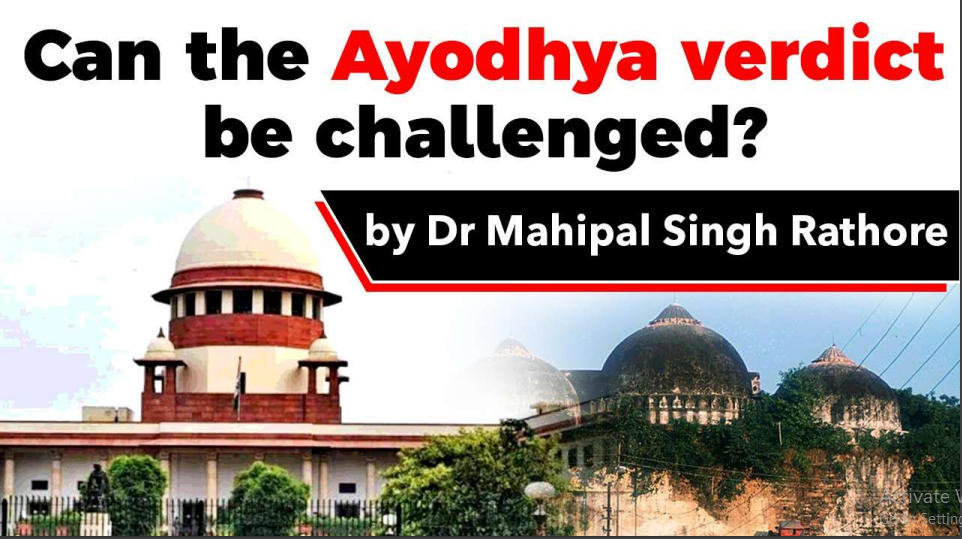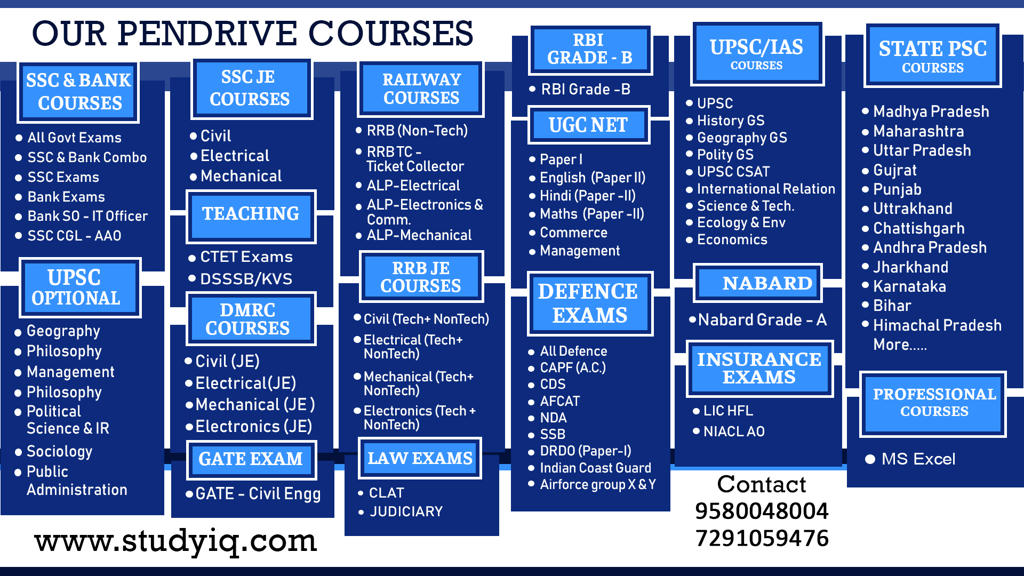Table of Contents
The Ayodhya Verdict
- Supreme Court delivered its much-awaited verdict in the landmark Ayodhya Ram Mandir-Babri Masjid land title dispute
- It ruled in favour of the Hindu side with regards to the ownership of the disputed piece of land.
- Ordered the government to allot a five-acre plot at a prominent place in Ayodhya to the Muslims to construct a new mosque.
- Ordered the Centre to form a trust that would look into the management of the disputed site.
- The bench comprised of CJI Ranjan Gogoi, Justice SA Bobde, Justice S. Abdul Nazeer Justice DY Chandrachud, Justice Ashok Bhushan
JURISDICTION OF THE SUPREME COURT
The Supreme Court has following jurisdiction –
- Original
- Appellate
- Advisory
What can you do if Supreme court does not rule in favour?
- In India, a binding decision of the Supreme Court/High Court can be reviewed in Review Petition. “Review” in legitimate speech means a legal reconsideration of the case, ‘review’ is “re-examination.
- Article 137 of the Constitution provides that subject to provisions of any law and rule made under Article 145 the Supreme Court of India has the power to review any judgement pronounced (or order made) by it.
- Under Supreme Court Rules, 1966 such a petition needs to be filed within 30 days from the date of judgement or order.
- The petition should be circulated to the same bench of judges that delivered the judgement (or order) sought to be reviewed
- A review petition is produced before the judges in their chambers and doesn’t come before an open court
- The Supreme Court may review its judgment or order but no application for review is to be entertained in a civil proceeding except on the grounds mentioned in Order XLVII, Rule 1 of the Code of Civil Procedure
- and in a criminal proceeding except on the ground of an error apparent on the face of the record (VERY RARE).
- Note – a review petition is viable only on restricted grounds.
Basis of Review petition
A review petition is not entertained in civil proceedings unless it is in accordance to the grounds mentioned in Order XLVII, Rule I of the Civil Procedure Code which consists of:
- Some slip-up or blunder obvious on the record.
- The revelation of new and essential matter or evidence which, after the practice of due diligence, was not within the know how or couldn’t be delivered by the personal when the decree or order was passed.
- Whatever other adequate reason.
Chances of getting a review petition admitted successfully
- The plausibility of a review petition to be successful in the Supreme Court is extremely meagre .
- Only when a judge of the Supreme Court resigns there is a chance – as the review petition is always produced before the same bench which has already heard the matter/ case.

The Ayodhya suit Litigants
- The Ayodhya case had a total of 14 litigants and 5 civil suits The major ones who CAN file a review petition are :-
- Nirmohi Akhara
- Sunni Central Waqf board
- Shia Central Waqf board
Nirmohi Akhara
- In 2010, the Allahabad High Court had divided the disputed land in Ayodhya between the Nirmohi Akhara, the deity Ram Lalla and the Sunni Waqf Board.
- Supreme Court held that the Allahabad High Court was wrong in dividing the land into three parts.
- The court also dismissed the exclusive claim made by the Nirmohi Akhara over the entire disputed land.
- It has however left it to the government to take a call if the Nirmohi Akhara should be given any role in the trust that will be formed by the government as per the court’s order.
- NOT FILING REVIEW (AS PER MEDIA REPORTS)

- Iqbal Ansari, son of Hashim Ansari – the oldest Muslim litigant out of 14 litigantssaid he will not challenge it in court.
Shia Waqf Board
- The Supreme Court unanimously dismissed the claims of ownership over the disputed site made by the Shia Waqf Board.

Sunni Waqf Board
- In 2010, the Allahabad High Court had awarded one-third of the disputed land in Ayodhya to the Sunni Waqf Board.
- The Board is the main litigant from the Muslim side and in a statement has said it “welcomes” the order and will not file any review petition to challenge it.

- Uttar Pradesh Sunni Central Waqf Board’s lawyer Zafaryab Jilani expressed dissatisfaction over the Supreme Court’s verdict, saying it has a lot of contradictions and they will seek a review.
- Zafaryab Jilani is also AIMPLB secretary
- He said Sharia laws do not allow the AIMPLB to handover or gift a mosque to any other party.
- He later clarified that the press conference was organised by the All India Muslim Personal Law Board (AIMPLB) and he had reacted as its secretary and not as the counsel for the Sunni Waqf Board.
Last resort
- Furthermore, even after dismissal of a review petition, the SC may consider a curative petition
- In order to prevent abuse of its process and to cure gross miscarriage of justice. (VERY RARE)
- A judgement once delivered is final.
- “A departure from that principle can be justified only when circumstances of a substantial and compelling character make it necessary to do so
Latest Burning Issues | Free PDF























 WhatsApp
WhatsApp